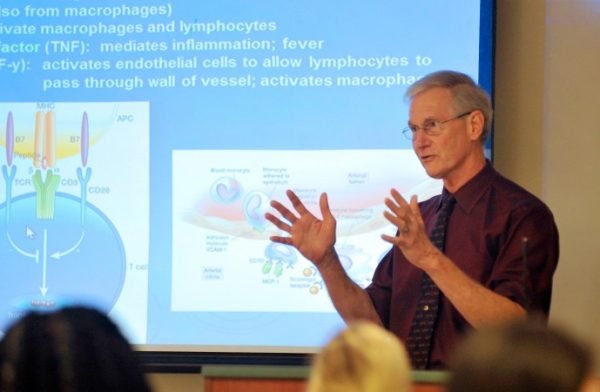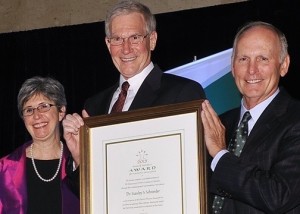Biological Sciences Professor Earns UNC Charlotte Top Teaching Honor

Professor of Biological Sciences Stanley Schneider is the 2015 recipient of the Bank America Award for Teaching Excellence, one of UNC Charlotte’s most prestigious honors.
He received the award during a special ceremony Friday, Sept. 18, at Bank of America’s Founders Hall. Schneider and the other four award finalists were recognized for their sustained commitment to teaching excellence. The other four finalists are Beth Whitaker, associate professor of political science and public administration in the College of Liberal Arts & Sciences; John Beattie, assistant professor of special education and child development in the College of Education; Moutaz Khouja, professor of business information systems and operations management in the Belk College of Business; and Mohamed Shehab, associate professor of software and information systems in the College of Computing and Informatics.
“Teaching excellence requires a strong sense of direction, but it also requires one to have the courage to risk getting lost in the wilderness every once in a while,” said Provost Joan Lorden. “Excellent professors motivate students to harness their own creativity and resourcefulness so that they are able to seek answers to important questions, view the world differently and change lives for the better.”
As a teacher, one of Schneider’s goals is to change the way students think about and live on Earth. “I want them to experience awe and a sense of privilege and responsibility for living on this planet,” he said.
Schneider’s passion for animal behavior, social insects including honeybees, and the evolution of social behavior is infectious, and his students thrive under his guidance. Schneider and colleagues explore how honeybees communicate, with potential implications for honeybee health.
Teaching is a social interaction, as the contagious enthusiasm of the teacher can capture students’ imaginations and help them dream, Schneider said. Excellent teachers are rigorous and fair, and they demonstrate respect for students by holding them to high standards of performance by providing clear, organized and relevant lectures, he said.

Schneider receives award from Provost Joan Lorden (left) and Chancellor Philip Dubois.
Schneider exposes students to the process of conducting research as he views this as the primary means by which students learn how new information is generated and synthesized into an existing body of knowledge. Since joining the UNC Charlotte faculty in 1985, Schneider has worked with approximately 140 graduate and undergraduate students through individualized instruction, many of whom have gone on to become productive biologists, teachers, researchers and entrepreneurs.
Close to 60 percent of the Biological Sciences Honors students working with Schneider have published with him, some with multiple publications. Because of the finite time period during which undergraduates work with him, obtaining enough data to publish can at times prove difficult. This remains a goal for him, however.
“In a university, teaching and research are inextricably interlinked,” he said. “Lectures give people the background information necessary to train them to start applying it. Research training trains them to generate that knowledge themselves. So, you can’t separate the two. The interaction of those two is what moves education forward and what moves human understanding forward.”
Because of his research on honey bees, Schneider frequently is invited to give talks to beekeeping associations and gardening and birding clubs. Given the worldwide decline of pollinators, he sees these talks as an important public service, as he draws upon his research to teach the general public more about the role they can play in helping to combat the problem.
Schneider earned a doctoral degree in animal behavior from the University of California at Davis in 1984. His bachelor’s and master’s degrees in biology are from Texas State University.
The UNC Charlotte Bank of America Award for Teaching Excellence was first presented in 1968 to recognize outstanding faculty members at the University.
Images: Wade Bruton